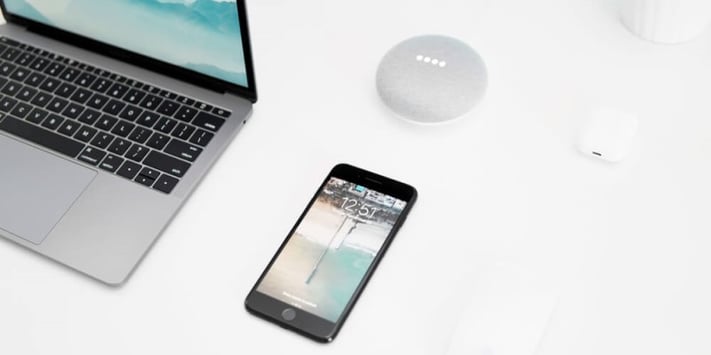It is estimated that by 2020, the world will have more than 20.4 billion connected devices, creating one enormous intertwined network called the Internet of Things (IoT). In hospitality, IoT can be the key to achieving a complete personalised guest experience at an optimised operating cost. Embracing IoT’s endless possibilities can certainly help hoteliers create a good head start in their digital transformation journey.
How will you leverage IoT for your hotel?

How can you apply the Internet of Things in hospitality?
IoT represents the ability to connect any physical object with the internet. It has been used in many household appliances in (what we call today) “smart houses”.
Many hotels have already implemented some forms of IoT to centrally monitor guest room temperature through sensors installed in the thermostats or HVAC systems. This allows hotels to reduce the energy costs of cooling or heating vacant rooms.
Furthermore, IoT plays a critical role in providing utmost comfort, seamless hospitality experience and a luxurious stay for the guests by utilising the data acquired during their previous stay.
Personalising the guest experience
Once the guests enter the hotel, they will instantly receive a welcome notification that includes all the services offered, their rewards, incentives as well as other activities and events happening during their stay.
The guests can unlock their rooms, adjust the temperature and lightings, order room services etc. from their own smart devices. In addition, the hotels can install a virtual assistant into each guest’s TV, or place other voice command devices, such as Amazon Alexa, in the room, to communicate with the guests with minimal friction and maximum accuracy.
Maintaining facilities, cutting down on unwanted expenses
As mentioned above, almost all room features, from in-room lightings, temperature, to curtains, shower, TV and housekeeping, can be easily and centrally monitored. As such, towels, bed sheets and laundry requests can be quickly fulfilled. Power is automatically turned off if the guests leave the balcony door open, or they’ve left the room. This, in turn, helps the hotels to cut down on energy costs.
Furthermore, IoT can help hotels to save even more through predictive analytics — a forecasting capability that predicts the time that issues might occur to a piece of equipment. Hotels can avoid embarrassing moments by the appliances breaking down or any last minute rearrangement just because the facilities are not well maintained.
Read more: What is Predictive Maintenance (PdM)? Its Pros and Cons
Tracking and managing inventories
One of the challenges that modern hotels face is how to automate front desk tasks. Up until now, the front office still manually inputs entries into their property management systems.
Read more: Key Concepts in Revenue Management: Relevant Data and Intelligent Pricing
IoT can revolutionise how hotels track and manage their inventory, item by item via remote scanners and other high-tech devices. Smart equipment enables the staff to keep tabs on inventory automatically, freeing up their time, allowing them to work more productively and efficiently on other demanding tasks.
Meeting guests’ demands and expectations
Consumer behaviour changes over time. In a customer-centric industry like hospitality, the consumers expect an easy interaction with the hotels just like how they interact with others at home.
The network of connecting devices brings back tons of data. This data then can be analysed to identify the guest’s behaviour patterns, which allows hotels to offer the most relevant, up-to-date services and activities based on the guests’ preferences and past behaviours.
Security challenges when implementing IoT Tech
In order to fulfil the promise of providing a seamless front-end service, the hotel needs a frictionless back-end support with tight security and adequate data management. Having said that, many IoT-supported devices were manufactured without cyber protection in mind, making them vulnerable to threats. Hackers can infiltrate through the appliance networks and invade the hotel's digital infrastructure.
However, this shouldn't be a hindrance for any hotel to adopt IoT. Rather, hotel executives should leverage this technology to leap forward.
We're living in an era where digital and physical worlds collide, but instead of destroying each other, they coexist. Everything is connected. And by leveraging the right tools, setting up the right ambience with the right amount of automation, and added layers of security, you're making your hotel appear to be the expert of the industry which can result in building brand loyalty and creating new revenue streams.
Technology used in Internet of Things (IoT)
The IoT is an umbrella term representing any device that has the ability to connect, or disconnect, to the Internet. Examples of IoT applications can range from household appliances, wearable devices to aeroplanes, etc.
According to Gartner, by 2020, there will be more than 26 billion devices have access to the Internet. As mentioned above, the IoT is like a giant net where “things” (people-people, people-machine, machine-machine) can connect to each other.
Infographic: GE vs Siemens for the Industrial Internet of Things
This giant network of connections allows you to do many things. Smart cars or smart houses are the perfect examples. Imagine you are waking up and your alarm already notified the coffee machine to start brewing, the curtains are pulled, and the shower is ready for you. Or you may be late for work due to traffic congestion, your smart car immediately sends out notifications to your managers or find the best route to avoid the problem.
On a larger scale, when technologies have developed enough, it transforms cities into smart cities to combat issues such as energy inefficiency and waste management. When it comes to the benefits of IoT in our daily lives, the possibilities are endless.
IoT Tech and other industries
1. IoT and the manufacturing industry
The continuous stream of data that “things” can deliver back is creating new business models for manufacturers.
For example, large equipment manufacturers now can charge customers a pay-per-use fee, rather than enter into simple rental agreements. This model might include charging customers based on how much they use a product, rather than charging a single upfront price.
In the support arena, smart products can send an alert when service is needed based on operating performance, rather than chronological milestones, saving customers time and improving service profitability.
Connected products can provide technicians with valuable insights about specific components, parts and performance issues, allowing the technician to be well prepared for the service call, with the appropriate replacement parts and recommendations for repair or replacement. Other business models using smart sensor data wait to be discovered and may offer a significant competitive advantage to first movers.
More of the products that manufacturers produce are being designed for the IoT. One high-visibility example is the smart car. Already, major auto manufacturers, including Ford®, General Motors®, Toyota®, and Volkswagen®, are producing connected vehicles with WiFi capabilities throughout the passenger cabin. Some models combine cameras and sensors to help drivers avoid collisions and parallel park automatically. Read more >>
2. IoT and the retail industry
Innovative retailers are utilising IoT to improve store operations, enhance customer experience and to drive more conversions. IoT technology is said to be reshaping and revolutionising the retail industry, yielding advances and new opportunities in customer service, throughout the supply chain and in brick-and-mortar stores plus other channels.
Over time, IoT has been integrated into multiple tools including RFID inventory tracking chips, cellular and Wi-Fi tracking systems, digital signage or right in the customer’s mobile device.
One of the key characteristics of IoT is that it builds a bridge between the physical and digital worlds. Specifically, connecting the virtual and physical shops has been made possible in the retail industry for quite a long time. IoT helps retailers to provide services anytime, anywhere and anyhow their customers want.
One example of the customer-centric approach is Under Armour’s case – the American footwear manufacturer and sports apparel. They are testing the application of smart chip on their footwear product. The chip is connected to various apps: MapMyFitness, MyFitnessPal or Endomondo to gather data and analyse the way a person runs. The insights are then used to create a revised and customised piece of footwear. Continue reading >>
3. IoT and the F&B industry
The Food and Beverage (F&B) industry has been an early adopter of IoT. F&B businesses are under pressure to keep themselves up-to-date with the trend and having an investment in advanced technologies. The transition is overwhelming for those who aren’t ready yet. For businesses that don’t know where to begin, this blog shall suggest you with steps to take and what you’ll gain with the integration of IoT.
Yield improvement is the highest priority for farmers since cost pressures start to rise and trade wars and tariffs get complicated. Starting from the farm itself, farmers are now utilising sensors to keep track of the moisture level of the soil, thus having an appropriate response. Sensors allow farmers to optimise irrigation, switch between locations or even shutting off if needed. All are done automatically with the purpose of maximising the crop yield per acre. Continue reading >>
 English
English  Vietnamese
Vietnamese 


